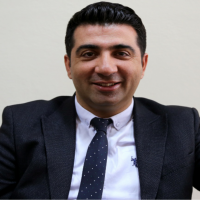Research Article
Aim & Scope
IJARE is an open access publication and it is in continuous-publication online format. It publishes peer-reviewed, original research and review articles in an interactive, open access format. IJARE does not charge any publication fee. IJARE publishes one issue per year as of 2019.
Articles may span the full spectrum of educational sciences. IJARE is an electronic publication dedicated to the discussion, sharing, and reflection of current educational research that will enhance our understanding of teaching and learning. IJARE publishes papers that report findings from empirical research and literature-based scholarly articles that advance theories in education. The journal also accepts critical reviews of books.
Author Guidelines
Manuscripts must only be submitted in English. You can prepare your manuscript according to this T E M P L A T E . Please also download the Copyright form and upload during submission after having it signed by each author.
IJARE adopts a double blind, peer review process in which two reviewers will be selected to perform an anonymous, in-dept evaluation of each submitted manuscript.
Initially, the editor and the associated editors will examine whether the submission is suitable for IJARE focus. In cases where there is conflict of interest for any of the editors, responsibility for the manuscript will be turned over to another member of the team of editors.
Two reviewers will be selected to evaluate the paper on the basis of their expertise in relation to the subject matter presented.
The reviewers will be asked to follow the journal's policy and declare any conflicts that would preclude a fair and balanced evaluation of the manuscript. Also, they will be required to treat all the information in the manuscript as confidential.
Submissions must be recommended for publication by at least two reviewers. If contrasting recommendations are received, a third reviewer will be appointed to make the final decision. Identity of the reviewers will remain anonymous.
Manuscripts will be examined based on scientific merit. Reviewers are expected to return their reviews within 4 weeks and will be asked to assign to the submitted manuscript one of the following recommendations:
- Accept without revision;
- Accept with minor revision, which does not require reconsideration by peer reviewers;
- Major revision needed, with the author required to revise and resubmit the manuscript for reconsideration by peer reviewers.
- Not suitable
for publication at IJARE.
After the review process, if the manuscript is accepted with revisions, the author(s) is/are asked to revise the paper in a reasonable time. Next, the revised manuscript is either checked by the editor(s) or the relevant reviewers (if he/she asked to see the revisions). If the reviews are found adequate, the manuscript is considered for publication in the early view immediately and the next issue at the end of the year. The process from submission to publication in early view takes an average of 4 months.
IJARE does not limit content due to page budgets or thematic
significance. Rather, IJARE evaluates the scientific and
research methods of each article for validity and accepts articles solely on
the basis of the research. This approach allows readers greater access.
Ethical Principles and Publication Policy
For all parties involved in the act of publishing (the author, the journal editor(s), the peer reviewer and the publisher) it is necessary to agree upon standards of expected ethical behavior. The ethics statements for IJARE are based on the Committee on Publication Ethics (COPE)' Best Practice Guidelines for Journal Editors:
Duties of the Editors-in-Chief
Fair play
Submitted manuscripts are evaluated for their intellectual content without regard to race, gender, sexual orientation, religious belief, ethnic origin, citizenship, or political philosophy of the authors.
Confidentiality
The Editor-in-Chief and any editorial staff must not disclose any information about a submitted manuscript to anyone other than the corresponding author, reviewers, potential reviewers, other editorial advisers, and the publisher, as appropriate.
Disclosure and conflicts of interest
Unpublished materials disclosed in a submitted manuscript must not be used in an Editor's own research without the explicit written consent of the author(s).
Publication decisions
The handling Editor-in-Chief of the journal is responsible for deciding which of the submitted articles should be published. The Editor-in-Chief may be guided by the policies of the journal's Editorial Board and constrained by such legal requirements as shall then be in force regarding libel, copyright infringement and plagiarism. The Editor-in-Chief may confer with other editors or reviewers in making this decision.
Duties of peer reviewers
Contribution to editorial decisions
Peer review assists the Editor-in-Chief in making editorial decisions and, through the editorial communication with the author, may also assist the author in improving the manuscript.
Promptness
Any invited referee who feels unqualified to review the research reported in a manuscript or knows that its timely review will be impossible should immediately notify the Editor-in-Chief so
that alternative reviewers can be contacted.
Confidentiality
Any manuscripts received for review must be treated as confidential documents. They must not be shown to or discussed with others except if authorized by the Editor-in-Chief.
Standards of objectivity
Reviews should be conducted objectively. Personal criticism of the author is inacceptable. Referees should express their views clearly with appropriate supporting arguments.
Acknowledgement of sources
Reviewers should identify relevant published work that has not been cited by the authors. Any statement that an observation, derivation, or argument had been previously reported should be
accompanied by the relevant citation. A reviewer should also call to the Editor's attention any substantial similarity or overlap between the manuscript under consideration and any other
published data of which they have personal knowledge.
Disclosure and conflict of interest
Privileged information or ideas obtained through peer review must be kept confidential and not used for personal advantage. Reviewers should not consider evaluating manuscripts in which they
have conflicts of interest resulting from competitive, collaborative, or other relationships or connections with any of the authors, companies, or institutions connected to the submission.
Duties of authors
Reporting standards
Authors reporting results of original research should present an accurate account of the work performed as well as an objective discussion of its significance. Underlying data should be represented accurately in the manuscript. A paper should contain sufficient detail and references to permit others to replicate the work. Fraudulent or knowingly inaccurate statements constitute unethical behavior and are unacceptable.
Originality and Plagiarism
The authors should ensure that they have written entirely original works, and if the authors have used the work and/or words of others that this has been appropriately cited or quoted.
Multiple, redundant or concurrent publication
An author should not in general publish manuscripts describing essentially the same research in more than one journal or primary publication. Parallel submission of the same manuscript to more than one journal constitutes unethical publishing behavior and is unacceptable.
Acknowledgement of sources
Proper acknowledgment of the work of others must always be given. Authors should also cite publications that have been influential in determining the nature of the reported work.
Authorship of a manuscript
Authorship should be limited to those who have made a significant contribution to the conception, design, execution, or interpretation of the reported study. All those who have made significant contributions should be listed as coauthors. Where there are others who have participated in certain substantive aspects of the research project, they should be named in an Acknowledgement section.
The corresponding author should ensure that all appropriate co-authors (according to the above definition) and no inappropriate co-authors are included in the author list of the manuscript, and
that all co-authors have seen and approved the final version of the paper and have agreed to its submission for publication.
Hazards and human or animal subjects
If the work involves chemicals, procedures or equipment that have any unusual hazards inherent in their use, the authors must clearly identify these in the manuscript.
Disclosure and conflicts of interest
All authors should disclose in their manuscript any financial or other substantive conflict of interest that might be construed to influence the results or their interpretation in the manuscript. All sources
of financial support for the project should be disclosed.
Fundamental errors in published works
When an author discovers a significant error or inaccuracy in his/her own published work, it is the author’s obligation to promptly notify the journal’s Editor-in-Chief or publisher and cooperate with
them to either retract the paper or to publish an appropriate erratum.
Publisher’s confirmation
In cases of alleged or proven scientific misconduct, fraudulent publication or plagiarism the publisher, in close collaboration with the Editors-in-Chief, will take all appropriate measures to clarify the situation and to amend the article in question. This includes the prompt publication of an erratum or, in the most severe cases, the complete retraction of the affected work.
The Publisher and the Journal do not discriminate on the basis of age, color, religion, creed, disability, marital status, veteran status, national origin, race, gender, genetic predisposition or carrier status, or sexual orientation in its publishing programs, services and activities.
ULAKBİM Dergi Sistemleri
Price Policy
IJARE does not charge any publication fee.
Indexes
Citation Indexes
Journal Boards
Editor-in-Chief

Co-editor

Field Editors



International Review Board






Editor-in-Chief


This work is licensed under a Creative Commons Attribution 4.0 International License.



